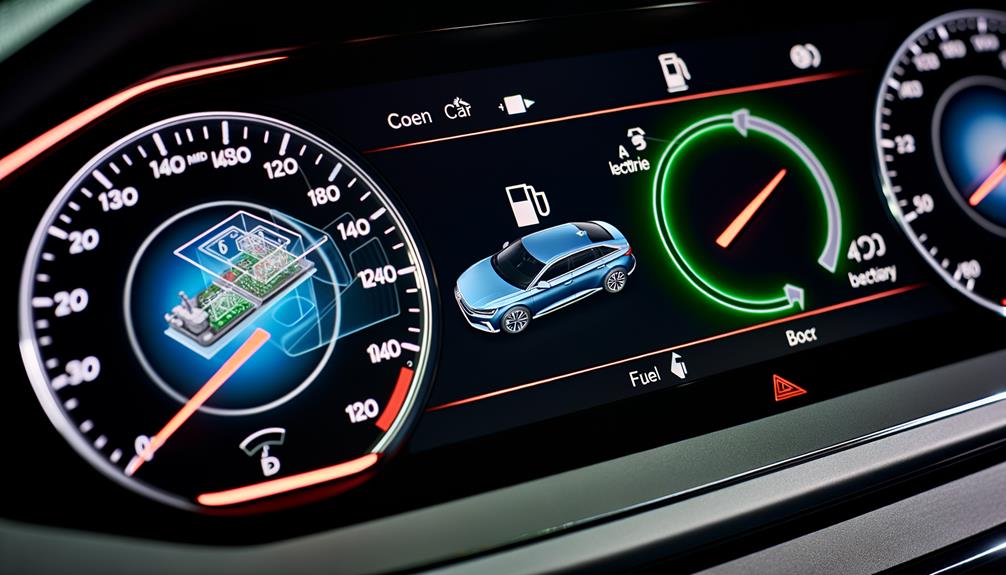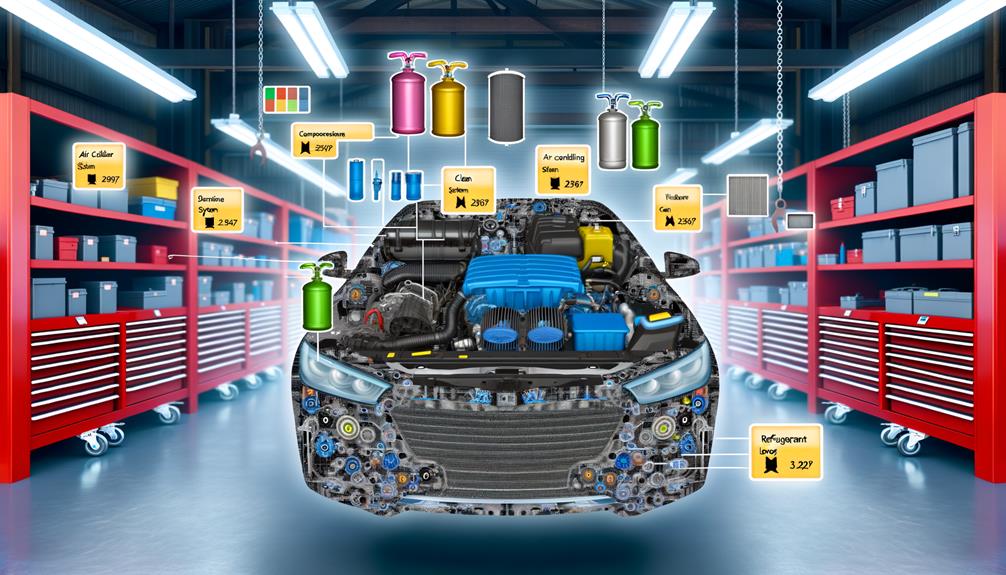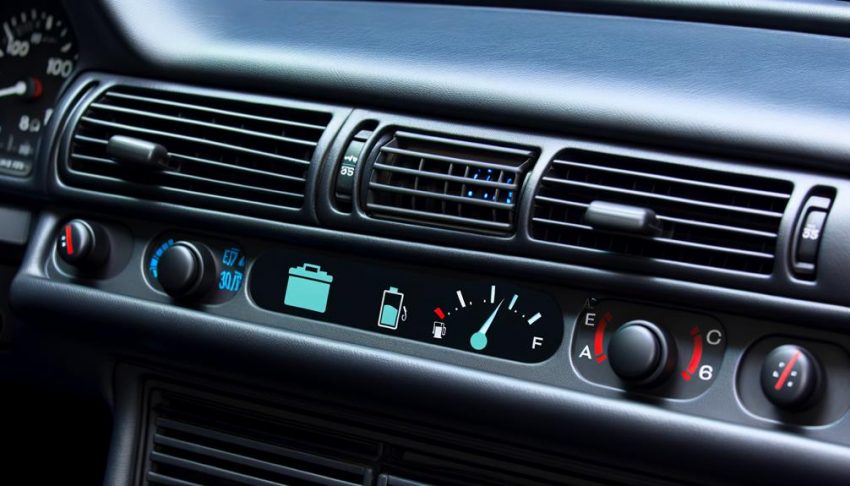You might wonder whether your car's air conditioning runs on gas or electricity, and the answer isn't as straightforward as you'd think. While traditional internal combustion engines primarily use gasoline to power the AC, electric vehicles rely solely on electricity. This difference not only affects how the AC operates but also impacts your fuel efficiency and overall driving experience. Curious about how the components of your car's AC system work and how you can optimize its efficiency? Let's explore the intricacies of automotive air conditioning to understand its true impact on your vehicle.
Contents
How Car AC Works
A car's air conditioning system operates by circulating refrigerant, which is initially compressed into a high-pressure gas by the compressor, powered by the engine's energy. This process begins with the compressor, a vital component that forces the refrigerant into a high-pressure, high-temperature gas state.
Once the refrigerant exits the compressor, it flows into the condenser. Here, it releases heat and shifts into a liquid form. This release of heat is fundamental, as it prepares the refrigerant for the next stage of cooling. The liquid refrigerant then moves to the expansion valve, which meticulously regulates its flow. As the refrigerant passes through this valve, it expands and drops in pressure, converting back into a gas.
This low-pressure gas then enters the evaporator, a key part of the air conditioning system located within the vehicle's cabin. In the evaporator, the refrigerant absorbs heat from the air inside the car. By absorbing this heat, the refrigerant effectively cools the air, which is then circulated back into the cabin, providing the desired cooling effect.
However, it's vital to understand that this entire process requires energy. Since the compressor is powered by the engine, running the air conditioning system makes the engine work harder, thereby increasing fuel consumption. Fundamentally, car AC uses gas, as the engine must burn more fuel to generate the extra energy needed to power the compressor.
To guarantee the system operates efficiently, the receiver/drier removes any moisture and impurities from the refrigerant, preventing ice crystal formation that could impede system performance. By maintaining this cycle, your car AC keeps you cool, albeit at the cost of additional fuel usage.
Components of Car AC System
Five main components form the backbone of your car's AC system: the compressor, condenser, expansion valve (orifice tube), receiver/drier, and evaporator. Each plays a vital role in the cooling process, ensuring that you get the comfort you need while driving.
| Component | Function | Keywords |
|---|---|---|
| Compressor | Compresses refrigerant gas into high-pressure fluid | compressor, refrigerant |
| Condenser | Releases heat and condenses refrigerant into liquid | condenser, cooling process |
| Expansion Valve | Regulates refrigerant flow, lowers pressure | expansion valve, refrigerant |
| Receiver/Drier | Removes moisture and contaminants | receiver, refrigerant |
| Evaporator | Absorbs heat from cabin air, produces cool air | evaporator, cooling process |
The compressor is the heart of the AC system, driven by the engine. It compresses the refrigerant gas into a high-pressure fluid. This pressurized refrigerant then flows into the condenser, where it releases heat and condenses into a liquid as air flows over its coils.
Next, the liquid refrigerant passes through the expansion valve. The expansion valve is essential for regulating the flow of refrigerant, allowing it to expand and lower in pressure. This sudden drop in pressure prepares the refrigerant for its journey through the evaporator.
In the evaporator, the refrigerant absorbs heat from the cabin air, effectively cooling it down before it is circulated back into the cabin. This absorption of heat turns the refrigerant back into a gas.
Lastly, the receiver/drier acts as a reservoir for the refrigerant and eliminates any moisture or impurities, preventing ice formation and ensuring the smooth operation of the AC system.
Understanding these components and their roles can help you appreciate the technical precision behind your car's AC system, ensuring efficient cooling and comfort.
Fuel Consumption Impact

Understanding the fuel consumption impact of your car's air conditioning system is essential for enhancing both comfort and efficiency. When you activate the air conditioning, your vehicle's engine experiences an increased load, which demands additional energy. This is primarily because the AC uses the engine's power to operate the compressor, which circulates refrigerant through the system.
The energy required for this process leads to a considerable decrease in fuel efficiency. Studies have shown that using the air conditioning can reduce fuel efficiency by up to 10%, especially in stop-and-go traffic conditions. In city driving, where frequent acceleration and deceleration are common, the impact on fuel economy is even more pronounced. This is due to the engine's need to repeatedly overcome inertia, which is further exacerbated by the additional load from the AC.
Moreover, factors such as outside temperature, driving speed, and the specific model of your vehicle can notably influence the extent of fuel consumption when using the air conditioning. For instance, at higher driving speeds on highways, the aerodynamic drag becomes a more significant factor, slightly mitigating the relative impact of the AC on fuel economy. However, at lower speeds, as typically seen in urban environments, the AC's energy demands become more prominent.
The alternator, which is powered by the engine, uses gasoline to energize the AC compressor. This further establishes the link between air conditioning operation and increased fuel consumption. By understanding these dynamics, you can make more informed decisions about when to use the AC, balancing the need for comfort with the desire for enhanced fuel efficiency.
Efficiency and Fuel Economy
Reflecting on the intricate relationship between air conditioning use and fuel economy, it's important to understand how efficiency can be maximized. Air conditioning systems in cars primarily rely on engine power, which translates to increased fuel consumption since the AC compressor is driven by the engine's serpentine belt. This means that using the AC can reduce your vehicle's fuel efficiency by up to 10%, a notable factor to take into account, especially in stop-and-go traffic where the impact is more pronounced.
When driving at highway speeds (55 mph and above), utilizing the AC can actually be more fuel-efficient than driving with the windows down. This is due to reduced aerodynamic drag, which is a major consideration for maintaining peak fuel efficiency. The Society of Automotive Engineers (SAE) highlights that open windows can cause an 8% decrease in fuel efficiency for SUVs, underlining the importance of strategic AC usage in such vehicles.
Moreover, proper maintenance of your AC system is vital for enhancing its efficiency and mitigating the additional fuel consumption associated with its use. Making sure that refrigerant levels are adequate and checking for leaks can greatly improve the performance of your car's air conditioning system. By maintaining ideal refrigerant levels, you can guarantee that the system operates effectively, reducing the overall demand on the engine and thereby conserving gas.
Maintenance Tips

Regular upkeep of your car's air conditioning system can greatly enhance its efficiency and longevity. One vital aspect is regularly checking and maintaining refrigerant levels. If refrigerant levels drop, your AC system can't cool effectively and may suffer from increased wear. This routine check guarantees peak performance and prevents potential damage.
Next, pay attention to your cabin air filters. Clean or replace them periodically to guarantee proper airflow and maintain high air quality within the vehicle. Dirty filters can obstruct airflow, reducing cooling efficiency and straining the AC components.
Inspecting AC components like the compressor, condenser, and evaporator is essential. These parts are integral to the system's function, and any signs of wear or damage can lead to system inefficiencies or failure. A damaged condenser, for instance, can impede proper airflow, greatly impacting the cooling process.
Professional servicing should be scheduled at least once a year. A qualified technician can detect and repair leaks, check refrigerant levels, and address any system inefficiencies that might not be apparent during regular inspections. This proactive approach can save you from costly repairs down the line.
Additionally, keep the AC system clean. Remove any debris and dirt from the condenser to guarantee proper airflow. A clogged condenser can severely reduce cooling efficiency, putting additional strain on the AC system.
Environmental Considerations
When considering environmental impacts, it's essential to recognize that modern car air conditioning systems can greatly increase fuel consumption, thereby elevating emissions. Compliance with stringent environmental regulations has led manufacturers to adopt more efficient refrigerants with lower global warming potential. By focusing on modern refrigerant efficiency, you can reduce your vehicle's ecological footprint and align with sustainable automotive practices.
Modern Refrigerant Efficiency
Efficiency in modern refrigerant technology isn't just a buzzword; it's a vital aspect of reducing the environmental footprint of automotive air conditioning systems. Modern refrigerant efficiency has become a focal point in designing vehicle air conditioners to mitigate environmental impact. By utilizing refrigerants with lower global warming potential (GWP), such as R-1234yf, manufacturers considerably reduce the environmental footprint compared to older refrigerants like R-134a.
These advancements lead to improved AC system designs, which lower energy consumption and emissions. Utilizing eco-friendly refrigerants is not only beneficial for reducing GWP but also necessary for minimizing ozone depletion potential.
With the push towards eco-friendliness, manufacturers have adopted refrigerants that align with international environmental agreements. This shift to refrigerants with lower GWP, combined with improved system designs, guarantees that vehicle air conditioners operate more efficiently, conserving energy and reducing the overall environmental impact.
Consumer awareness also plays a key role. As more people understand the importance of using eco-friendly refrigerants, demand for vehicles with sustainable cooling technologies will grow. This collective effort helps in achieving a considerable reduction in the environmental footprint of automotive air conditioning systems.
Compliance With Regulations
Adherence to environmental regulations is paramount for modern vehicle air conditioning systems, which are meticulously designed to meet stringent standards aimed at minimizing ozone depletion and global warming impacts. Compliance with these environmental regulations necessitates the use of advanced refrigerants with lower Global Warming Potential (GWP). For instance, HFO-1234yf is commonly adopted due to its eco-friendly properties compared to traditional refrigerants like R-134a.
The automotive industry's commitment to reducing emissions and fuel consumption drives the development of energy-efficient technologies for AC systems. By integrating these technologies, manufacturers not only achieve compliance with regulatory standards but also enhance the overall fuel efficiency of vehicles. This reduction in fuel consumption directly correlates to lower greenhouse gas emissions, contributing to a smaller carbon footprint.
Regular maintenance of your car's air conditioning system is essential for ensuring ongoing compliance with environmental regulations. Leaks can release harmful refrigerants into the atmosphere, undermining the system's environmental benefits. Routine inspections and timely repairs can prevent such leaks, maintaining the integrity of the eco-friendly refrigerants and the efficiency of the air conditioning system. By prioritizing maintenance, you're actively participating in efforts to protect the environment.
Frequently Asked Questions
Does AC Use Gas in Your Car?
Your car's AC system efficiency directly impacts fuel consumption due to increased engine load effects. Climate control impacts can reduce fuel efficiency by up to 10%. Proper maintenance, refrigerant types, and mindful driving habits can mitigate these effects.
Does Turning off AC in Car Save Gas?
Yes, turning off the AC can save gas. It reduces engine load and boosts fuel efficiency. Adjusting driving habits, improving temperature control, and managing air circulation enhance comfort levels. Consider maintenance tips and seasonal usage for ideal results.
Does AC Run on Gas or Electric?
You'll find AC efficiency varies: gas cars rely on gasoline consumption, while electric vehicles use electric systems. Consider environmental impact and performance factors. Regular maintenance tips enhance cooling mechanisms, and energy alternatives affect overall efficiency.
Will a Car AC Compressor Work Without Gas?
Without gas, the compressor operation won't function, as engine power is needed. Ascertain refrigerant levels are adequate and perform regular system maintenance. Electrical components should be checked to maintain performance efficiency and address noise issues in climate control.
Conclusion
In summary, your car's air conditioning system primarily uses gas to power the compressor, which inevitably impacts fuel consumption. Understanding this, you should guarantee regular maintenance and ideal refrigerant levels to enhance efficiency. While electric vehicles sidestep this issue by using electricity, traditional internal combustion engines face decreased fuel economy when the AC is running. By taking these considerations into account, you can mitigate environmental impacts and maintain better overall vehicle performance.
